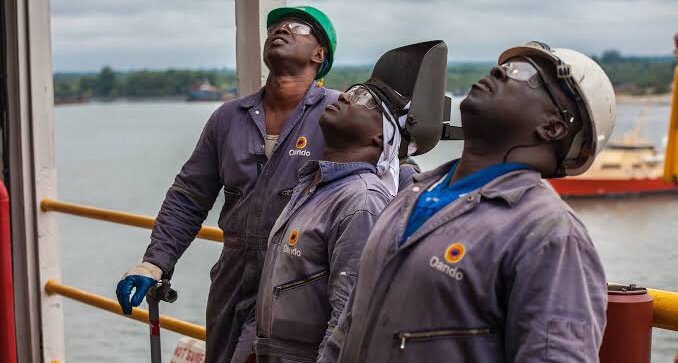Oando Plc, one of the sub-Saharan Africa’s leading indigenous energy companies, could be likened to an idea whose time has come.
In reminiscence, its paths in the nation’s oil and gas industry, beginning in 1994 with the establishment of Ocean and Oil Services Limited, had been laced with more roses than thorns.
At the outset, the visionaries, Jubril Adewale Tinubu, Omamofe Boyo and Onajite Okoloko, who could be regarded as kindred spirits, had a burning ambition and were not dispirited by any perceived boulder in their way.
Though many industry watchers didn’t anticipate their coming, it wasn’t a case of a bridge too far or a river so deep and wide to cross for these business wizards.
Ocean and Oil Services Limited had established been to supply diesel and Low Pour Fuel Oil (LPFO) to various shipping firms and offshore exploration companies in Nigeria.
No doubts, it was a humble beginning, as the budding oil company started out only with a vessel, MT Carolina, anchored in Bonny Island, Rivers State to supply diesel and Low Pour Fuel Oil (LPFO) to off-shore companies from the Port-Harcourt, Rivers State refinery.
Interestingly, just six years after its emergence on the nation’s thriving oil market, Ocean and Oil Services Limited had begun to show flashes of a potentially big player, particularly with the acquisition of six ships, a development that shocked its morbid critics who didn’t give it any chance of survival.
In 2000, Tinubu and his co-travellers on this ambitious journey jolted industry watchers when they expressed interest in acquiring a 30 % controlling interest in the defunct Unipetrol.
The move was a swift response to the government’s decision to sell its controlling 60% stake in Unipetrol Plc, an integrated downstream oil marketing company.
In hindsight, the show of interest by the partners had come with some mild drama from the least expected quarter. Those in the know at the time claimed that a former Managing Director of the defunct Unipetrol had laughed it off a huge joke. His reasons, it was alleged, was that it was inconceivable that Ocean and Oil Services Limited, an upstart company, would acquire an already top-quoted company on the Lagos Stock Exchange.
But before the eyes of the renowned seasoned technocrat and other nitpickers, the planned acquisition recorded no hitch. And by 2001, Ocean and Oil Services had increased its shares in Unipetrol to 42%.
The company was able to wrought this magic with an impressive support from its foreign technical partners, Compagnia Espanola De Petroleos (CEPSA), the second largest oil group in Spain.
Again, in 2002, these enterprising and go-getting businessmen fortuitously became the object of global interest, when Ocean and Oil Services Limited acquired a 60% stake in Agip Nigeria Plc.
It all began when Agip Petroli International BV of Italy decided to divest from the downstream sector. With their eyes fixed on the future, the business partners, after wide consultations and meeting of minds, bought over the foreign company’s shares and added Agip Nigeria Plc, the company’s
local subsidiary, to their portfolio, using a N9.2 billion four-year syndicated loan from a consortium of local and international lenders, to finance its purchase.
About a year after, in 2003, the newly acquired companies were merged, resulting in the historic birth of Oando Limited.
That singular audacious move, in the eyes of many players in the industry, spoke to the sense and rhyme in the saying of Henry Ford, an American industrialist and founder of Ford Motor Company that “ Coming together is a beginning, staying together is progress and working together is success.”
Indeed, if anyone had thumped his chest that it would take the partners eons to break into the international market, he was mistaken! Their success story has defied all imaginable hypotheses, as Oando Plc was able to secure a cross-border listing on the Johannesburg Stock of Exchange (JSE) in South Africa in 2005!
Indeed, if you could undertake an anatomy of Oando, which has become a like a multi-trunk tree, you would marvel at the tireless efforts of Tinubu and his partners to constantly keep the company as one of the most-talked about in the energy business, locally and internationally.
In a spate of three decades, Tinubu and his partners have been able to maintain their preeminence in the sector owing to the value-added services rendered by the company’s subsidiaries: Oando Marketing Limited, OML, one of the largest downstream petroleum marketing companies in Nigeria with over 500 retail outlets across Nigeria, Ghana, and Togo; Oando Supply and Trading Limited, OST, one of the largest independent traders of crude and refined petroleum products in sub-Saharan Africa incorporated in 2004; Oando Gas & Power Limited, OGP, a pioneer in the development of Nigeria’s foremost gas distribution network, spanning 264km and serving over 150 industrial and commercial customers in Lagos, Calabar and Port Harcourt incorporated in 2004; Oando Energy Services Limited, OES, Nigeria’s largest indigenous oilfield services provider incorporated in 2005 to enhance indigenous participation with a fleet of 5 rigs; Oando Energy Resources, OER, one of Nigeria’s foremost indigenous upstream oil and gas companies.
In his subconscious, Tinubu, the Group Chief Executive Officer, GCEO, has always been desirous of making the company to be head and shoulders above its competitors.
Perhaps, this explains why about 10 years into its operations, Oando set forth on the upstream journey by securing a 42.75% interest in the marginal field, OML 56.
It later steadied its feet in 2007, with the acquisition of a 15% stake in OML 125 & OML 134.
Still waxing stronger, it also acquired a 30% interest in the Akepo marginal field, OML 90 in 2008.
Again, the acquisition of an 81.5% interest in Equator Exploration Limited in 2009, was another interesting chapter in the annals of the company.
Three years after, specifically in 2012, Oando was awarded a 100% in Blocks in Sao Tome EEZ.
Even so, history its replete with how Oando Energy Resources, OER, had, in 2014, acquired ConocoPhillips Nigerian assets for $1.8bn (inclusive of working capital), secured a 20% interest in the NAOC-Joint Venture (“the JV”) and augmented its total net 2P reserves to 503 million barrels of oil equivalent (mmboe), with peak net production levels of 45,000 barrels of oil equivalent per day (kboep/d).
In 2016, industry watchers were astounded when news broke that the Company was divesting from its Naira-earning businesses to focus on its US$-earning portfolio.
Though the reactions were not unexpected, it was a well considered move by the management, which in the periodic sale of its interest in the downstream between 2016 and 2019 as well as its stake in the midstream in 2017.
So far, Tinubu has proven that they can see tomorrow today ! In 2021, the Company added Oando Clean Energy Limited to his portfolio. Though it aims to design and deliver clean energy projects, it is ultimately to fast-track the nigeria’s energy requirements, while also fulfilling the United Nation’s Race to Net Zero.
How more timeous can the Oando Clean Energy be ? Soon after its launch, the Lagos Government, in sheer recognition of the boundless goodies inherent in the project, beat a path to its door.
Contrary to the thinking in some quarters, it didn’t take forever for the Company and the Lagos State Government to sign an MoU to replace the state’s mass transit bus system with electric mass transit buses along with the supporting infrastructure.
In view of this, the Company, in May 2023, rolled out two electric mass transit buses in fulfilment of the Proof-of-Concept Phase, with 552 buses to be secured by the end of 2023.
Ten years after the widely reported purchase of ConocoPhillips Nigerian asset, Oando, in August 2024, completed the acquisition of 100% of Eni’s interest in NAOC, the operating company of the JV, thereby increasing its stake in the JV from 20% to 40%, and securing operatorship of the JV as well as doubling its 2P reserves to 996.2 mmboe.
In a surprising twist of fate, the company, for the first time in its long years of operations recorded an unsavory development when it announced a loss of N184bn in the 2014 financial year.
Today, it has become Nigeria’s largest non-government owned company in the energy industry with a market value soared to record highs from N74 billion in 2023 to N1 trillion.
Though there were reports of agitations in some quarters, the company, by the middle of that year, achieved a great feat that gladdened the hearts of its shareholders, by getting new investors, including Vitol, a Dutch oil trading giant, and Helios Holdings, to put their money in its downstream arm, Oando Marketing. Without a doubt, this is the stuff from which legends are made.
For some time now, Tinubu has made commitment to be processing oil not only to make Nigeria self-sufficient but also supply petrol, diesel et al to other African countries. To actualise this dream, Oando is currently planning to establish a 360,000-capacity refinery estimated at N254 billion in Lagos, which will include a 210,000 metric tonnes fuel terminal.
More than ever before, Tinubu seems to be unstoppable in their efforts to continuously expand the company’s exploratory asset base portfolio, while positioning itself for the energy transition through the development of its renewable energy business.
As it celebrates its 30 years anniversary, everyone is waiting with bated breath for the next move from the man known for been very bullish in diversifying Oando’s operations as he establishes footprints along the value chain.
Adeoye Adebayo





















